最新非谓语动词表格形式word版本
- 格式:doc
- 大小:79.00 KB
- 文档页数:7
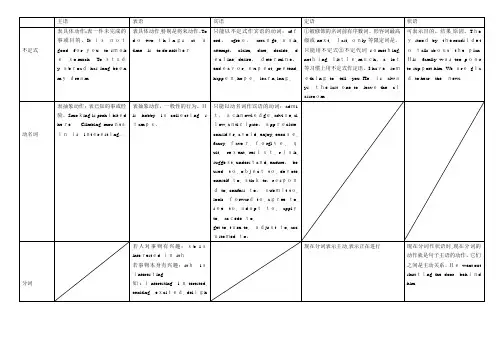
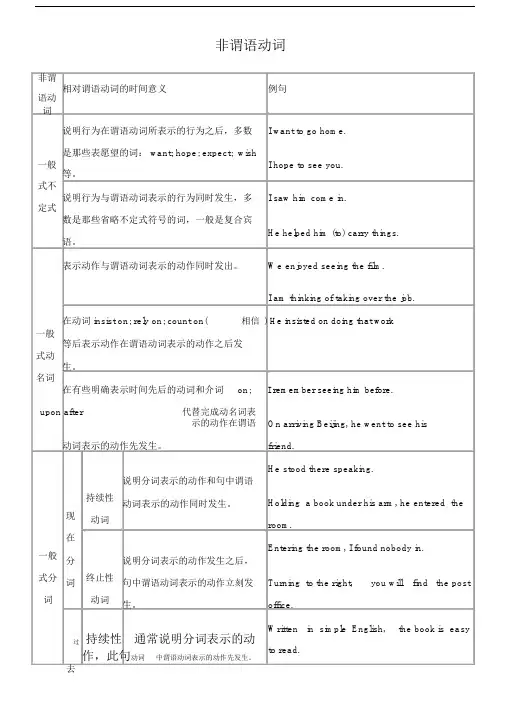
非谓语动词非谓相对谓语动词的时间意义例句语动词说明行为在谓语动词所表示的行为之后,多数I want to go home.一般是那些表愿望的词: want; hope; expect; wishI hope to see you. 等。
式不I saw him come in.定式说明行为与谓语动词表示的行为同时发生,多数是那些省略不定式符号的词,一般是复合宾He helped him (to) carry things.语。
表示动作与谓语动词表示的动作同时发出。
We enjoyed seeing the film.I am thinking of taking over the job.在动词 insist on; rely on; count on(相信) He insisted on doing that work一般等后表示动作在谓语动词表示的动作之后发式动生。
名词在有些明确表示时间先后的动词和介词on;I remember seeing him before. upon after代替完成动名词表示的动作在谓语动词表示的动作先发生。
说明分词表示的动作和句中谓语持续性动词表示的动作同时发生。
现动词在一般分说明分词表示的动作发生之后,式分词终止性句中谓语动词表示的动作立刻发词动词生。
过持续性通常说明分词表示的动作,此句动词中谓语动词表示的动作先发生。
去On arriving Beijing, he went to see hisfriend.He stood there speaking.Holding a book under his arm, he entered the room.Entering the room, I found nobody in.Turning to the right, you will find the post office.Written in simple English, the book is easy to read.分I can't find my lost pen.词说明分词表示的动作和句中谓语He is a person well-known in this country.动词表示的动作并无先后。
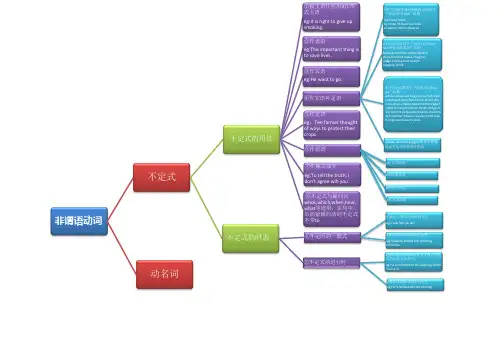
式主语eg:It is right to give up smoking.②作表语eg:The important thing is to save lives.③作宾语eg:He want to go.④作宾语补足语feel.hear.listen to.make.lrt.have.see.look at.watch.notice.observe 2下列动词课用于“动词do+believe.consider.count.declare. deny.feel.find.guess.imagine. judge.know,prove.realize. suppose.think3do mand.dare.determine.direct.disc over.drive.enable.expect.encourage.f rm.invite.oblige.or der.permit.persuade.prepare.recomm enf.remide.request.require.send.teac h.urge.want.warm.wish.4 hope.demand.suggest 动词不定式作宾语补足语⑤作定语eg Tee farmer thoughtof ways to protect their crops.⑥作状语1作目的状语2作结果状语3作条件状语4⑦作独立成分eg:To tell the truth, I don't agree wih you.whos,which,when,how,what ①不定时的一般式 1 eg:I saw him go out.2eg:I plan to attend the meeting ②不定式的进行时式的动作正在进行。
eg:He pretended to be sleeping when I came in.2eg:He is believed to be coming.不定式的时态③不定式的语态动或被动依照其含义而定eg:To love and to be loved is the greatesthappiness of life2在句中做后置定语修饰名词3不定式有副词的句法功能,后置修饰形容词时常用主动形式。
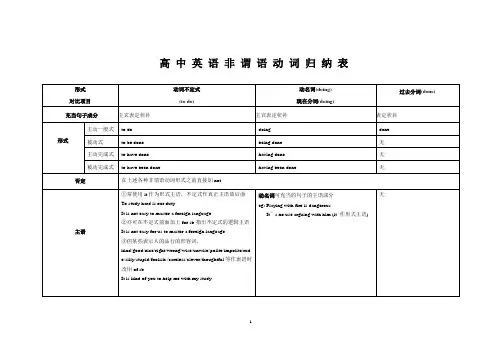
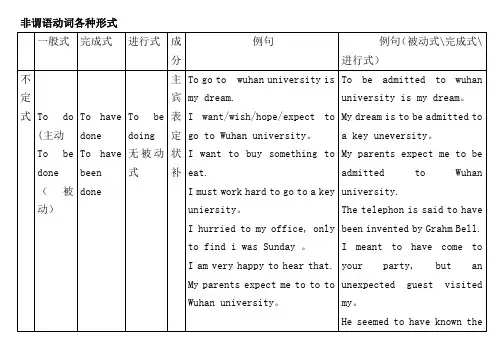
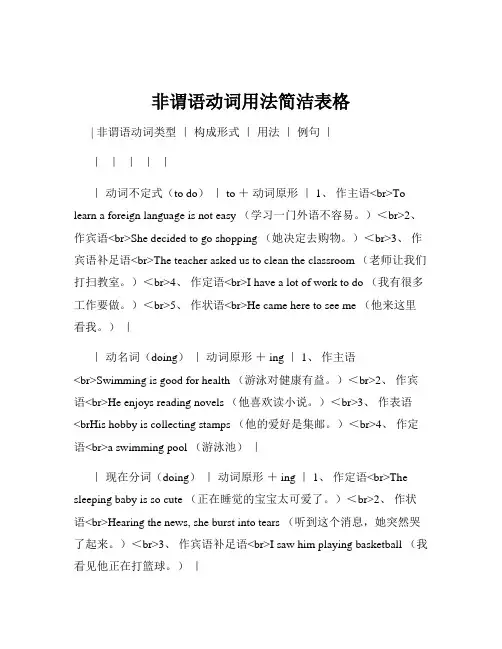
非谓语动词用法简洁表格| 非谓语动词类型|构成形式|用法|例句|||||||动词不定式(to do)| to +动词原形| 1、作主语<br>To learn a foreign language is not easy (学习一门外语不容易。
)<br>2、作宾语<br>She decided to go shopping (她决定去购物。
)<br>3、作宾语补足语<br>The teacher asked us to clean the classroom (老师让我们打扫教室。
)<br>4、作定语<br>I have a lot of work to do (我有很多工作要做。
)<br>5、作状语<br>He came here to see me (他来这里看我。
)||动名词(doing)|动词原形+ ing | 1、作主语<br>Swimming is good for health (游泳对健康有益。
)<br>2、作宾语<br>He enjoys reading novels (他喜欢读小说。
)<br>3、作表语<brHis hobby is collecting stamps (他的爱好是集邮。
)<br>4、作定语<br>a swimming pool (游泳池)||现在分词(doing)|动词原形+ ing | 1、作定语<br>The sleeping baby is so cute (正在睡觉的宝宝太可爱了。
)<br>2、作状语<br>Hearing the news, she burst into tears (听到这个消息,她突然哭了起来。
)<br>3、作宾语补足语<br>I saw him playing basketball (我看见他正在打篮球。
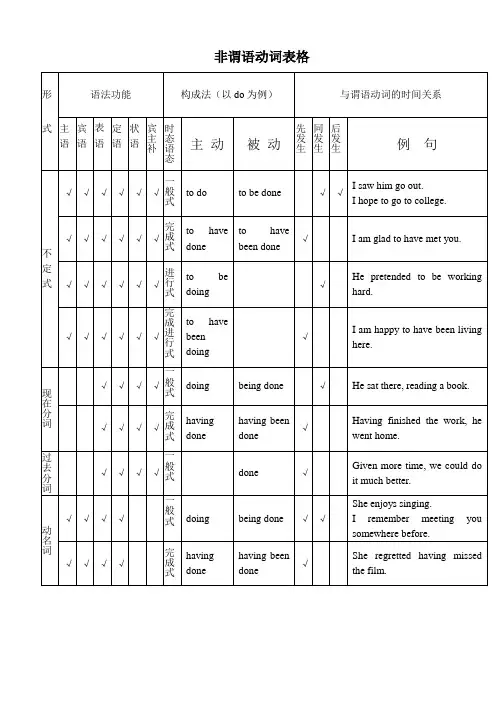
非谓语动词表格人称代词表格称代词表格形容词性物主代词与名词性物主代词的区别一.形容词性物主代词起形容词的作用,用在名词前。
例:1. This is my book.这是我的书。
2. We love our motherland['m???l?nd] (祖国).我们热爱我们的祖国。
二.名词性物主代词起名词的作用。
例:1. Look at the two pencils. The red one is yours and the blue one is mine. 看那两支铅笔,红的是你的,蓝的是我的。
2. He likes my pen. He doesn't like hers.他喜欢我的钢笔。
不喜欢她的。
3. 注意:在使用名词性物主代词时,必须有特定的语言环境,也就是要省略的名词大家已经知道,已经提起过。
例:It's hers.是她的。
(单独使用大家不知是怎么回事,不可以这样用)There is a book. It's hers.那有本书。
是她的。
(先提及,大家才明白)4. 名词性物主代词=形容词性物主代词+名词为避免重复使用名词,有时可用“名词性物主代词”来代替“形容词性物主代词+名词”的形式。
例:My bag is yellow, her bag is red, his bag is blue and your bag is pink. 为避免重复使用bag,可写成My bag is yellow, hers is red, his is blue and yours is pink.用法:1)物主代词既有表示所属的作用又有指代作用,例如:John had cut his finger; apparently[?'p?r?ntli] (显然地)there was a broken['br?uk?n]( break的过去分词破碎的;损坏的)glass on his desk.约翰割破了手指,显而易见,他桌子上有个破玻璃杯。
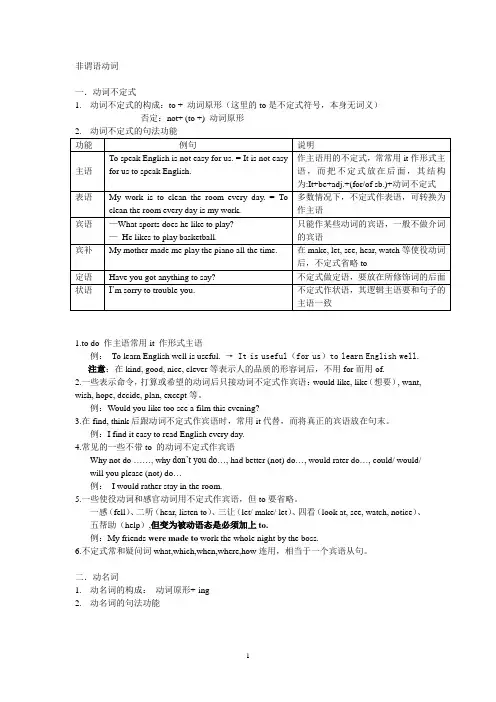
非谓语动词一.动词不定式1.动词不定式的构成:to + 动词原形(这里的to是不定式符号,本身无词义)否定:not+ (to +) 动词原形1.to do 作主语常用it 作形式主语例:To learn English well is useful.→ It is useful(for us)to learn English well.注意:在kind, good, nice, clever等表示人的品质的形容词后,不用for而用of.2.一些表示命令,打算或希望的动词后只接动词不定式作宾语:would like, like(想要), want, wish, hope, decide, plan, except等。
例:Would you like too see a film this evening?3.在find, think后跟动词不定式作宾语时,常用it代替,而将真正的宾语放在句末。
例:I find it easy to read English every day.4.常见的一些不带to 的动词不定式作宾语Why not do ……, why don’t you do…, had better (not) do…, would rater do…, could/ would/ will you please (not) do…例:I would rather stay in the room.5.一些使役动词和感官动词用不定式作宾语,但to要省略。
一感(fell)、二听(hear, listen to)、三让(let/ make/ let)、四看(look at, see, watch, notice)、五帮助(help),但变为被动语态是必须加上to.例:My friends were made to work the whole night by the boss.6.不定式常和疑问词what,which,when,where,how连用,相当于一个宾语从句。


非谓语动词图表非谓语在句中充当除谓语以外的句子成分的动词形式叫做非谓语动词。
非谓语动词分为三种形式:不定式、动名词和分词(分词包括现在分词和过去分词)逻辑主语与真正主语真正主语:谓语动作发出者,即真正主语。
逻辑主语:非谓语动作的发出者或者承受者。
构成非谓语动词句型的首要条件:逻辑主语与真正主语一致。
To acquire knowledge , you must study解析:条件:此句真正主语:you 逻辑主语:you 主语一致。
结论:可构成非谓语句型非谓语使用条件一个句子当中,已经存在一个主句(谓语动词),又没有连词的情况下She got off the bus but left her handbag on her seat. She got off the bus, leaving her handbag on her seat.三种非谓语动词形式句法功能比较主宾表定状补功能种类√√√√√√不定式动名词√√√√分词√√√√非谓语动词做主语的区别:区别举例不定式不定式做主语常表示某次具体的行为或将来的动作。
不定式做主语,一般用it当形式主语,把作主语的不定式短语后置。
To visit China is my nextgoal.It took me only fiveminutes to finish the job.动名词动名词做主语往往表示泛指的、一般的行为;Climbing mountains isgreat fun.It’s nice seeing you again.1. ________ a language requires time and effort.A. LearnB. LearningC. To learnD. Being learned2. It is not always easy ________ invitations.A. to refuseB. refusingC. to be refusedD.being refused3. How __________ the problem will be discussed at tomorrow’s meeting.A. to solveB. to be solvedC. being solvedD. solving4. It __________ forty-five minutes __________ there by bus.A. cost, to getB. takes, gettingC. takes, to getD. takes, to get to5. It is no good __________. You should give_________.A. to smoke, it upB. smoking, it upC. smoking, up itD. to smoke, up it做宾语的非谓语动词比较:情况常用动词只接不定式做宾语的动词agree (同意) , ask (请、要) , attempt (试图) , afford 付得起agree 同意ask 要求apply 申请care (想要) , choose (决定、要) , decide (决定) , desire (希望) , determine (决心) , help 帮助expect (期望) , fail (未能) , hope (希望) , intend (打算) , learn (学习) , manage (设法) ,offer (愿意) , plan (计划、打算) , pretend (假装) , refuse (拒绝、谢绝) , wish (希望) , promise (答应),want(想要)等等。
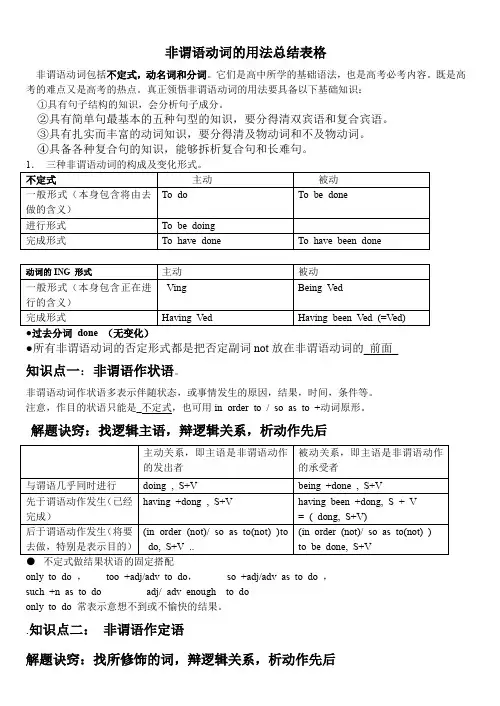
非谓语动词的用法总结表格非谓语动词包括不定式,动名词和分词。
它们是高中所学的基础语法,也是高考必考内容。
既是高考的难点又是高考的热点。
真正领悟非谓语动词的用法要具备以下基础知识:①具有句子结构的知识,会分析句子成分。
②具有简单句最基本的五种句型的知识,要分得清双宾语和复合宾语。
③具有扎实而丰富的动词知识,要分得清及物动词和不及物动词。
④具备各种复合句的知识,能够拆析复合句和长难句。
●所有非谓语动词的否定形式都是把否定副词not放在非谓语动词的_前面_知识点一:非谓语作状语。
非谓语动词作状语多表示伴随状态,或事情发生的原因,结果,时间,条件等。
注意,作目的状语只能是_不定式,也可用in order to / so as to +动词原形。
解题诀窍:找逻辑主语,辩逻辑关系,析动作先后●不定式做结果状语的固定搭配only to do ,too +adj/adv to do,so +adj/adv as to do ,such +n as to do adj/ adv enough to doonly to do 常表示意想不到或不愉快的结果。
.知识点二:非谓语作定语解题诀窍:找所修饰的词,辩逻辑关系,析动作先后,面须有相应的介词。
2. 不定式用来修饰名词,表动作未发生。
3. 不定式用来修饰被序数词,最高级等限定的中心词。
知识点三:非谓语动词做补语解题技巧:记固定搭配,辩逻辑关系不定式和分词作宾语补足语(we consider him to be a nice guy)或主语补足语(He is considered to be a nice guy)是考察的重点.做题时一要熟记固定搭配,还要仔细分析非谓语所表示的动作与谓语动作发生的先后问题。
A 固定句型sb/sth be said/believed/ reported/ considered/ thought to do /to be doing /to have done 要分清.B 弄清以下搭配及其意义1.感官动词see, watch, observe, hear, listen to, notice等后面的宾补有3种形式(do/doing/done),doing表主动或正在进行,done表被动或完成,do表主动和完成(被动句中to 还原)。
非谓语动词归纳总结一,非谓语动词的形式变化及其意义2,非谓语动词的运用及考题形式形式1,(If/Unless/When/Though/As)( )----------------------,句子(主语+谓语+宾语 ----- )(1)-------- To do 表目的(为了),发生谓语动词后,后面常带宾语(2)Doing/Having done----(当 - 时,如果,虽然,因为),后面常带宾语(3)Done/Having been done----(当-- 时,如果,虽然,因为),后面不带宾〖注意〗:1,(Do )---------------, and/but/or/if/when/before/after+主语+谓语+--------这是祈使句,所以用动词原2,(Doing/Being done)------------------is/was(谓语动词) ------------------------------ --.这是用动名词作主语〖例证〗:1,(look)carefully,and you can find the differences between the two pictures.2,(look)after his aged mother, he gave up the chance to go abroad for f urther study.3, (look) after yourself well is important when you are alone abroad.4, (look) after well by the nurse, the old man recovered quite quickly.5, (look) after well is a kind of love that our parents gave us.6, (look) for the book for a long time, he finally bought it in a bookstore occasionally.7, (look) after well by the nurse for two months,the old man finally recovered.形式2主语+谓语+宾语+------,()+------------1,doing(及物动词后面跟宾语)表示伴随,结果,方式2,done(及物动词后面不跟宾语)表示伴随,结果,方式3,only to do 表示结果〖例证〗1,A hearty laughter releases physical tension, ( )(leave) our muscle relaxed for half an hour. 2,The old grandma got off the bus, ()(support)by her granddaughter.3,We hurried to the railway station, only( )(find) the train had already left.4,He got up,washed his faces,had his breakfast, and( )(go) to work.形式3主语()+ 谓语+ 宾语()+-------------1,to do 将要做的to be done 将被做的(作定语或宾语补足语)2,doing 正在做的being done 正在被-- 的(作定语或宾语补足语)3,done 被----了的(作定语或宾语补足语)〖例证〗1,Anyone (see) (carry)bags,boxes,cases was stopped by the police.(作定语)2,Steam can be seen (rise) when water is heated.(作主语补足语)3,Seeing the roads (cover) with snow and ice, we decided to stay at home.(作宾语补足语)4,The building (complete) next month will be used as a laboratory.(作定语)5,The problem (discuss) now is not the one (discuss)at yesterday’s meeting (作定语)6,He spoke loudly enough to make himself (hear) clearly.(作宾语补足语)7,The government has taken effective measures (improve) the air condition in Beijing.(作目的状语)8,Don’t keep the water (run) when you brush teeth.(作宾语补足语)3,固定搭配1,跟不定式作宾语的动词Aim,appear,agree,arrange,decide,choose,demand,desire,determine,expect,hope,fail,happen, hesitate,learn,mean,manage,offer,plan,prepare,pretend,promise,refuse,attempt,want2,跟动名词作宾语的动词Consider,suggest,advise,excuse,pardon,admit,delay,putoff,fancy,avoid,miss,keep,practice,deny,finish,enjoy,appreciate,can’t help,forbid,imagine,risk,mind,allow,permit,escape3,to 后面跟动名词的短语Be/get used to,be related to,be addicted to,be opposed to,be devoted to,be adjusted to,be connected to,be compared to,lead to,object to,look forward to,stick to,pay attention to,contribute to,make contributions to,reply to,turn to,belong to,respond to。
非谓语动词一览表动词不定式的基本用法:一. 语法功能: 动词不定式具有名词、形容词和副词的特征,因此在句中可作主语、宾语、表语、定语、宾语补足语(主语补足语)、状语以及插入语(独立成分),唯独不可作谓语。
(主语)To scold her would not be just.(宾语)We are planning to build a Disney park here.(宾补)They hurriedly ended the meeting, leaving many problems to be settled.(表语)Our most urgent task is to make a careful analysis of the present situation.仔细分析当前的形势是我们最迫切的任务。
(定语)Do you have anything else to add? 还有什么要补充的吗(目的状语)Learn from past mistakes to avoid future ones. 惩前毖后。
(结果状语)He made a long speech only to show his ignorance of the subject.他大讲了一通,只暴露他对这门学科的无知。
(程度状语)I don’t know her to speak to.我认识她还不到能与她谈话的程度。
(原因状语) We shall be happy to co-operate with you in the work.(独立成分) To put it another way, do you like him?To be honest,I don’t know anything about it.I. 作主语:1. To say is easier than to do. =Saying is easier than doing.2. To see is to believe. =Seeing is believing.3. How to go there h asn’t been decided yet.4. Who to blame for the traffic accident is still a puzzle.5. Whether to go or stay is not known.6. It is important to study English well and go to college.7. It is our duty to give a hand to people in trouble.8. It takes me three hours to do house cleaning on Sundays.9. To master a foreign language is very important。
非谓语动词非谓语动词是指由动词变化而成,仍具有动词的性质与意义,但不能作为动词使用的词。
通常有三种形式构成:1.由“to+动词原形”而成的不定式;2.由“动词原形+ing”而成的现在分词或动名词;3. 由“动词原形+ed”而成的(包括动词的不规则变化)过去分词。
分词和动名词没有被动式。
2.非谓语的否定式都是由“not+非谓语”构成。
一、动词不定式的主要用法1.To finish the work on time is not easy.(作主语) (要准时完成这项任务并不容易。
)注意:动词不定式作主语时,也可以用形式主语“it”,即I t’s not easy to finish the work on time.His wish was to become a teacher.(作表语)(他的愿望是成为一名教师。
)There is nothing to worry about.(作定语)(没有什么可以担心的。
)He ran to catch the bus. (作状语) (他跑着去赶车。
)I want to see the new film.(作宾语)(我想要去看这部新电影。
)He asked me to open the door.(作宾语补足语)(他要我把门打开。
)注意:①动词不定式在作let,make,see,hear,feel,watch等使役、感观动词的宾语补足语时,不定式不带“to”例:We often hear her sing in the next room.(我们经常听到她在隔壁房间唱歌。
)但上述动词用于被动语态的句子中,动词不定式变成主语补足语,这时必须带“to”。
例:He was heard to sing in the next room every morning.(明天早晨他总是被听到在隔壁房间唱歌。
)②动词不定式作宾语时,也可用形式宾语“it”。
例:They found it impossible to get everything ready in time.2.动词不定式也可以和疑问词who,what,which,whether,when,how,where等连用,构成不定式短语。
非谓语动词一.动词不定式1.动词不定式的构成:to + 动词原形(这里的to是不定式符号,本身无词义)否定:not+ (to +) 动词原形2.动词不定式的句法功能1.to do 作主语常用it 作形式主语例: To learn English well is useful. → It is useful(for us)to learn English well.注意:在kind, good, nice, clever等表示人的品质的形容词后,不用for而用of.2.一些表示命令,打算或希望的动词后只接动词不定式作宾语:would like, like(想要), want, wish, hope, decide, plan, except等。
例:Would you like too see a film this evening?3.在find, think后跟动词不定式作宾语时,常用it代替,而将真正的宾语放在句末。
例:I find it easy to read English every day.4.常见的一些不带to 的动词不定式作宾语Why not do ……, why don’t you do…, had better (not) do…, would rater do…, could/ would/ will you please (not) do…例: I would rather stay in the room.5.一些使役动词和感官动词用不定式作宾语,但to要省略。
一感(fell)、二听(hear, listen to)、三让(let/ make/ let)、四看(look at, see, watch, notice)、五帮助(help),但变为被动语态是必须加上to.例:My friends were made to work the whole night by the boss.6.不定式常和疑问词what,which,when,where,how连用,相当于一个宾语从句。
二.动名词1.动名词的构成:动词原形+-ing2.动名词的句法功能常跟动名词作宾语的词:完成实践值得忙(finish, practice, be worth, be busy)继续习惯别放弃(keep on, be used to, give up)考虑建议不禁想(consider, suggest, can’t help, feel like)喜欢思念要介意(enjoy, miss, mind)三.分词1.构成:动词+ -ing动词 + -ed2.分词的句法功能四.易混清单1.动词后接不定式和动名词的区别stop to do sth. 停下来去做stop doing sth. 停止做remember to do sth. 记住要做某事(动作未发生)remember doing sth. 记得曾经做过某事(动作已发生)forget to do sth. 忘记做某事(动作未发生)Forget doing sth. 忘记做过某事(动作已发生)try to do sth. 努力去做某事Try doing sth. 试着去做某事go on to do sth. 做完一件事,接着去做另一件事go on doing sth. 继续不停地做某事allow doing sth. 允许做某事allow sb. to do sth. 允许某人做某事regret to do sth. 对要做的事感到遗憾(未做)Regret doing sth. 对做过的事感到遗憾,后悔(已做)mean to do sth. 打算,想做某事mean doing sth. 意味着做某事二.现在分词和动词不定式作宾语补足语的区别我们常见的动词有see, watch, notice, hear, feel, have等,它们接不带to的动词不定式作宾补,表示已经完成了的经常性的动作;接现在分词做宾补,表示动作正在进行着。
例: I heard him singing in the classroom. (“唱”这个动作正在进行)I heard him sing in the classroom. (“唱”这个动作已经结束) 三. Need, require, want 做“需要”解时,后加动名词主动式等于加不定式的被动式。
例: The window needs cleaning. →The window needs to be cleaned.want to be done=want doingneed to be done=need doingrequire to be done=require doing四.现在分词与过去分词的区别1.在语态上,现在分词表示主动,过去分词表示被动(修饰人用-ed,修饰物用-ing)。
例: the surprising news 令人惊讶的消息a surprised man 一个感到惊讶的人2. 在时间上,现在分词表示正在进行的动作,过去分词表示已近完成的动作。
例: the developing country 发展中国家the developed country 发达国家五.注意下列“to”是介词,不是动词不定式。
make (a) contribution(s) to 为……作贡献devote to 献身,致力于……look forward to 期盼,盼望prefer ……to……两者间更喜欢……be used to …习惯…….;适应……1.Granny often tells us ______ water in our daily life.A. saveB. savingC. to saveD. saves2.Richard turned off the computer after he had finished ______the email.A. writeB. to writeC. writingD. wrote3.Before going to the History Museum, our teacher told us ______ the public rules.A. obeyB. to obeyC. obeyingD. obeyed4.James, I’m too tired. Let’s stop ______ a rest.A. havingB. haveC. to havingD. to have5.—We can use QQ to chat with other on the Internet.— Really? Will you please show me ______it?A. how to useB. what to useC. how can I useD. what can I use6.—Where’s your brother now, Bob?— I saw him ______in the street a moment ago and I told him ______.A. playing; don’t do soB. playing; not do soC. play; to do so7.—Hi, Steve! Our teachers told us______ an electric bike. It’s too dangerous.—I’m sorry. I won’t do it again.A. to rideB. not rideC. not to ride8.As teenagers, we’re old enough ______ with housework. We can help set the table,wash the dishes and clean our own rooms.A. to helpB. helpingC. helped9.—Mary dances best in our school.—I agree. I’ll never forget ______ her dance for the first time.A. seeingB. to seeC. seeD. seen10.Chinese athletes did a great job in the Winter Olympics in Canada. It canencourage post-90s(90后)________.A. work hardB. worked harderC. working harderD. to work hard11.Don’t forget ____ an umbrella _____you. It’s going to rain.A. to take; toB. taking; toC. to take; withD. taking; with12.Nancy is really a hard –working student. We often see her ______ books in theclassroom.A. readB. to readC. reads13.—Are you going to the party______ at Smith’s home this evening?—I will if I am free.A. holdingB. heldC. to holdD. to be held14.Mrs. Smith made her students ______ the compositions three times a week.A. writeB. to writeC. writtenD. writing15.Danny did all kinds of things to make the baby ______.A. to stop cryingB. stop cryingC. to stop to cryD. stop to cry16.We have two rooms _____, but I can’t decide ______.A. to live; to choose which oneB. lived; choose which oneC. to lived in; which one to choseD. live; which one17.The teacher told the students ______ any food into the computer room.A. not to bringB. not bringC. don’t bringD. bring not18.At least 300 million people are using QQ ______ by Ma Huateng to chat on line.A. creatB. createsC. creatingD. created19.The teacher asked Ben ______ a difficult question in class.A. answerB. answeringC. to answerD. answered20.You’d better ______ too much time playing computer games.A. don’t spendB. not to spendC. to not spendD. not spend21.More and more young people are trying to do something ______ the old.A. servedB. to serveC. serveD. serves22. —Is Jack in the library?— Maybe. I saw him _____ out with some books just now.A. goingB. goC. to goD. went23— Dad, why should I stop ______ computer games?—For your health, my boy, I’m afraid you_______.A. to play; mustB. playing; have toC. to play; canD. playing; may24. — Have you seen the TV play My Ugly Mother?— Yes, it’s well worth ______. It’s ______ moving that I’ve seen it twice.A. seeing; tooB. to see; enoughC. seeing; soD. to see; such25. Why not ______ your teacher for help when you can’t finish ______ it by yourself?A. ask; writeB. to ask; writingC. ask; writingD. asking; writing26. If people _____ cutting down the forest, they will have nowhere________.A. keep; to live inB. will keep; tolive in C. keep; to live D. will keep; tolive27. His parents often encourage him ______ hard.A. workB. workingC. to workD. works28. Last week I met my old friend Li Ming but I forgot _______ him for his telephone number.A. askB. askingC. and askD. to ask29. Last weekend I went to the library _______ some books on how to protect environment.A. to borrowB. borrowC. borrowedD. borrowing30. — How do you feel when you watch the national flag go up?— It makes me ______ very proud.A. feltB. to feelC. feelingD. feel31. The boy promised _______ late for school again.A. to not beB. not to beC. not beingD. being not32. It’s very nice______ pictures for me.A. of you do drawB. for you to drawC. for you drawingD. of you drawing33. China will spend about 52 billion yuan ______ new airports and ______ old ones in the west of China in the 11th Five – Year Plan period. (时期)A. repairing; buildingB. to build; repairC. building;repairingD. to repair; build34. There are so many kinds of pens here. I can’t decide ______.A. when to chooseB. to choose whichC. which one to choose35. — What about playing football this afternoon, Sam?— I would rather ______ at home than ______ football. it’s too hot outside.A. stay; playingB. stay; playC. to stay; to playD. to stay; playing36. It took Li Ming an hour _____ his bike yesterdayA.to repairB. repairingC. repairedD. repair37. It’s important _______ the piano well.A. of him to playB. for him to playC. of him playingD. for him playing38. My job is _______ you Japanese.A. to teachB. teachC. teachesD. taught39. The doctor _______ a ______ boy yesterday.A. had saved; dyingB. saved; deadC. has saved; deadD. saved; dying40. Would you mind ______me how ______ English words?A. tell; to rememberB. telling;rememberC.telling; torememberD. tell; remember答案:1—5 CCBDA 6—10 BCAAD 11—15 CADAB 16—20CADCD 21—25 BBBCC 26—30 CCDAD 31—35 BACCB 36—40ABADC翻译六.我们的计算机系统出了毛病,但我觉得问题比较小。